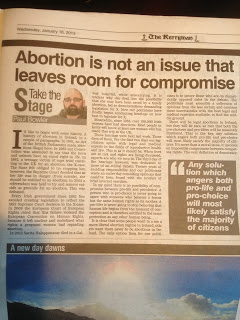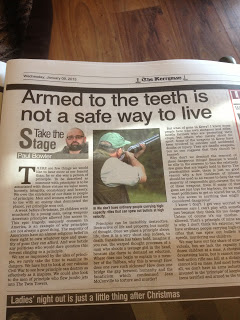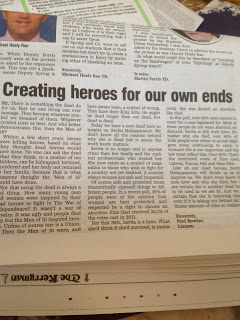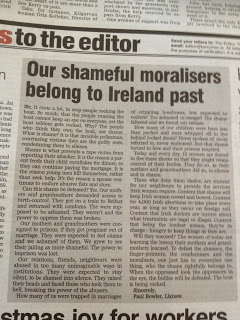My column in The Kerryman. 16 January, 2013
I’d like to begin with some history. A history of abortion in Ireland, in a couple of paragraphs. In 1861, an Act of the British Parliament made abortions illegal here. In 1983 our Constitution was amended to say that the born and unborn have an equal right to life. In 1992, a teenage victim of rape tried traveling to the UK for an abortion, the X-case. The State felt obliged to try stopping her, however, the Supreme Court decided that as her life was in danger (from suicide), she should be entitled to an abortion. In 2002 a referendum was held to try and remove suicide as grounds for an abortion. This was defeated.
Every Irish government since 1992 has avoided creating legislation to reflect the 1992 Supreme Court decision in the X-case. In 2009 the European Court of European Rights ruled that this failure violated the European Convention on Human Rights, because it left unclear and undefined what rights a pregnant woman had regarding abortion.
In 2012 Savita Halappanavar died in a Galway hospital, while miscarrying. It is unclear why she died, but the possibility that she may have been saved by a timely abortion, led to demonstrations demanding legislation for X. Now our politicians have finally begun conducting hearings on how best to legislate for X.
Meanwhile, since 1983, over 100,000 Irish women have had abortions. Most people in Kerry will know at least one woman who has made that trip to the UK.
Those hearings were held last week. Three days of them. For the first two days our legislators spoke with legal and medical experts in the fields of reproductive health and law. This is as it should be. When lives are at risk and rights are being discussed, experts are who we turn to. The third day of the hearings however, was dedicated to more of an ethical debate. Twenty years of avoiding responsibility and our politicians waste an entire day consulting opinions that could’ve been found with the briefest of brief internet searches.
To my mind there is no possibility of compromise between pro-life and pro-choice. A person who is pro-choice is never going to agree with someone who believes a foetus has the same human rights as its mother. A pro-lifer is never going to stop believing that human life begins from the moment of conception and is therefore entitled to the same protection as any other human being.
It is clear that some people want to a see a more liberal abortion regime in Ireland, others want there never to be abortions in Ireland. The only option then for our politicians is to ignore those who are on diametrically opposed sides in the debate. The politicians must assemble a collection of opinions from the less certain and combine these uncertainties with the best legal and medical expertise available, to find the middle ground.
There will be legal abortions in Ireland, but they will be rare, so rare that both the pro-choicers and pro-lifers will be massively frustrated. That is the key, any solution which angers both pro-life and pro-choice will most likely satisfy the majority of citizens. It’s more than a moral issue, it involves an impossible compromise between competing rights. The very definition of democracy.







